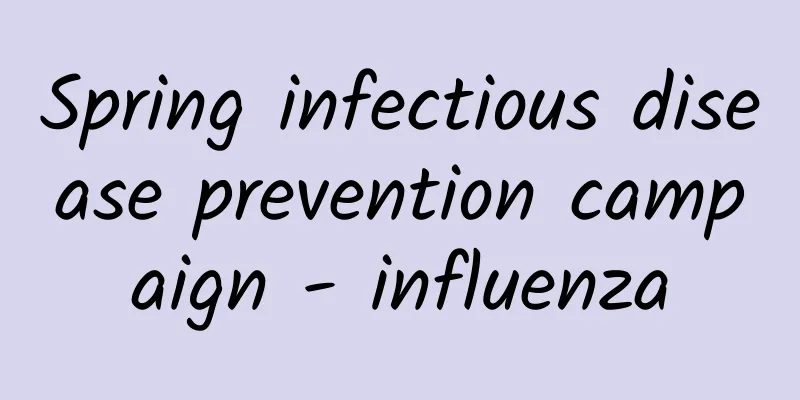Spring infectious disease prevention campaign - influenza

|
With the arrival of spring, the weather gradually warms up, but the temperature changes dramatically during the season change. The alternation of cold and warm weather causes respiratory infectious diseases to enter a high incidence period. At present, the respiratory infectious diseases are mainly influenza, which is a very common infectious disease. People of any age may be infected with influenza, and people with low immunity, such as the elderly and infants, are also more susceptible to it. If serious complications occur after influenza infection, it can be fatal, so we need to pay more attention to it. We should publicize influenza, a highly prevalent infectious disease in spring, so that everyone can correctly understand influenza, learn about the relevant knowledge of influenza prevention, and get the influenza vaccine in advance, which can effectively reduce the risk of influenza. Even if you are infected with influenza after vaccination, it can reduce the symptoms and severity of influenza. 1. What is influenza? Influenza is an acute respiratory infectious disease caused by influenza virus, which can be divided into three types: A, B and C. People can be infected through the droplets of influenza patients or through contact with objects infected with influenza virus. 2. Symptoms and characteristics of influenza The symptoms of influenza are very obvious, such as sudden high fever, severe headache, and muscle aches all over the body. In our daily lives, we can use antigen testing to determine whether we are infected with influenza. Patients with mild influenza can generally recover on their own and the illness lasts for a short time. Patients with more serious illness generally need drug treatment and have a good prognosis. However, it should be noted that influenza may also cause some serious complications, such as pneumonia, encephalitis, myocarditis, etc., which are also dangerous for severe patients. How to treat influenza If patients have flu symptoms such as fever, headache, muscle aches, etc., they should seek medical attention immediately. Generally, hospitals will conduct routine blood tests, virus isolation, serological tests, viral nucleic acid tests, viral antigen tests, etc. on patients to determine whether the patient is infected with influenza and what type of influenza he is infected with, and to distinguish it from the common cold and upper and lower respiratory tract infections, so that doctors can diagnose and treat the symptoms. If the influenza patient's illness is mild, he or she can generally recover on his or her own in a short period of time, which will not last more than two weeks. If the patient wants to relieve the uncomfortable symptoms of influenza, he or she can take oral medications to reduce fever or relieve cough and phlegm. He or she can also take oral Western medicine or Chinese patent medicine for antiviral treatment, such as oseltamivir, Lianhua Qingwen Capsules, etc., which are also very effective. IV. How to prevent influenza The prevention of influenza mainly involves preventing the pathogenic factors in advance and avoiding infection. Healthy people can prevent it through measures such as vaccination, preventive medication, and strengthening hygiene habits. In addition, during the peak season of influenza, people should try to avoid going to crowded places to reduce the route of infection. Daily life preventive measures: You should maintain good living habits, work and rest regularly, do not stay up late, exercise appropriately, and have a reasonable diet structure to improve your resistance and immunity. When the seasons change, you should add or remove clothes appropriately to avoid respiratory infections. Develop good personal hygiene habits. Wash your hands immediately after going out and return home. Wash your hands frequently before meals and after going to the toilet. The hand washing time must be guaranteed, and wash your hands thoroughly with running water. Avoid rubbing your eyes, touching your nose and mouth without washing your hands. You can use normal saline to clean your nasal cavity frequently. Open windows for ventilation indoors, ventilate for 2 hours a day, and keep the indoor air fresh to effectively prevent colds. During the high incidence season of influenza, you should try to avoid going to crowded places, and pay attention to wearing masks when traveling daily; if you have symptoms of respiratory diseases, you should rest at home to avoid worsening symptoms. If you need medical treatment, you should go to the hospital for diagnosis and treatment as soon as possible. Vaccination: Influenza vaccine is currently recognized by the world as an effective measure to prevent influenza. It is safe and reliable, but it should be noted that influenza vaccine should be administered every year. Vaccination can effectively prevent influenza infection, but people with a history of allergies should communicate with their doctors before vaccination to ensure the safety of vaccination. People with high risk factors for severe influenza, such as pregnant women, infants, preschool children, people over 60 years old, and patients with specific chronic diseases, are recommended to receive influenza vaccine every year if there are no contraindications. People who are easily exposed to sources of infection in their daily work should also receive influenza vaccine to avoid exposure to infection. Drug prevention: Influenza can also be prevented by oral medication, but it can only be used temporarily in emergency situations and cannot replace vaccination. For example, people who have been in contact with influenza patients but have not yet developed the disease can take oral oseltamivir and other drugs for influenza prevention. V. Conclusion Influenza is a very common infectious disease, but it is highly contagious and prone to complications, so it must be distinguished from the common cold. Influenza is generally prevalent in winter and spring, and can cause a worldwide epidemic and outbreak. Severe cases may cause complications and even death. This disease is not only harmful to humans, but also to animals. Therefore, we must actively promote knowledge about influenza, so that everyone can correctly understand influenza, prevent influenza scientifically, and vaccinate high-risk groups against influenza in advance to protect the health of themselves and their families. Author: Wang Zhenghui Shijiazhuang Gaocheng District Center for Disease Control and Prevention |
>>: 8 decompression methods to protect the knee joints, pay attention to them in daily life!
Recommend
The pros and cons of brown sugar water on menstruation
Brown sugar ginger water can be said to be a very...
Does moderate pelvic inflammatory disease affect pregnancy?
Moderate pelvic inflammatory disease means that t...
How to maintain the ovaries and uterus
The ovaries and uterus are the key organs for wom...
How to treat candidal vaginitis
Candidal vaginitis is a very common disease in gy...
What are the symptoms of severe cold and dampness in women?
Women's bodies are greatly affected by enviro...
Blood pressure in early pregnancy is as low as 90 to 60
Women need to take the initiative to do prenatal ...
Can I drink red wine during my period?
When women have their menstrual period, they must...
Does getting angry affect menstruation?
Getting a sore throat is caused by improper diet ...
Can breast enlargement be achieved during menstruation?
There are really many ways to enlarge breasts. Th...
Which type of abortion surgery is better?
No matter which method of abortion is used, it is...
Heat stroke in children: the invisible killer in summer, how much do you know?
Introduction: In the hot summer, beware of the da...
I took birth control pills and had blood in my vagina
Some female friends will take contraceptives if t...
Can I drink black chicken soup during my period? What is the best pot to cook black chicken soup?
Women are usually cold-natured, prone to cold han...
There are several types of dysmenorrhea
Dysmenorrhea is very familiar to women, and there...
Why pregnant women give birth to boys
After pregnancy, the probability of having a boy ...









